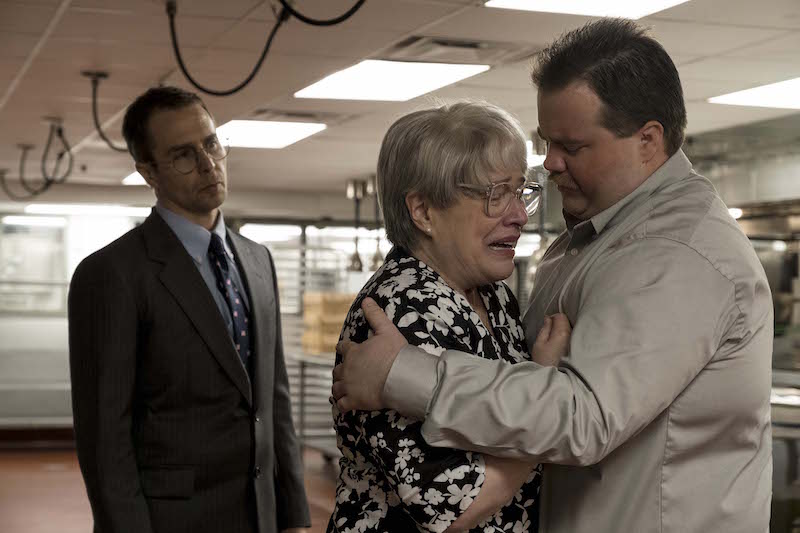
Capital Projections: Heroes and villains edition
Capital Projections is The DC Line’s selective and subjective guide to some of the most interesting arthouse and repertory screenings in the coming week.
RICHARD JEWELL
There aren’t a lot of leading dramatic roles for an actor like Paul Walter Hauser. With an amiable demeanor and a Falstaffian girth, he’s played colorful supporting roles in such films as I, Tonya and BlacKkKlansman, but casting agents seem more likely to sign him up for comedies like Super Troopers 2. Which makes his performance in the title role of Richard Jewell, director Clint Eastwood’s dryly effective biopic, all the more revelatory.

Inspired by a 1997 article in Vanity Fair, Eastwood and screenwriter Billy Ray tell the story of Jewell (Hauser), who worked security for AT&T during the 1996 Summer Olympics in Atlanta. After Jewell discovered a bomb during a concert at Centennial Park, he became a media darling, but the hero treatment took an abrupt turn when he became the FBI’s leading suspect — and the subject of aggressive media speculation that stemmed from an Atlanta Journal-Constitution article by Kathy Scruggs (Olivia Wilde).
The AJC, among others, has taken issue with the film’s portrayal of Scruggs, who died in 2001. Wilde depicts the late journalist as a conniving, almost reptilian vamp who seems to seduce an FBI agent (played by Jon Hamm) in order to get the scoop on Jewell. However, AJC staff states that Scruggs did not use sex to get a story, and the newspaper stands by the substance of her reportage. Wilde, for her part, has stated on Twitter that, as she understood it, “Kathy [the role she plays], and the FBI agent who leaked false information to her, were in a pre-existing romantic relationship, not a transactional exchange of sex for information.” Whatever the merits, the controversy has overshadowed Hauser’s terrific performance as an Everyman who quickly becomes a pariah. With an understated grace, Hauser conveys Jewell’s eagerness to please and his appreciation for and eventual discomfort with the spotlight.
Jewell may not be someone that everybody would want to hang out with, but Hauser portrays him as a well-meaning ordinary guy whose life falls apart. The filmmakers make easy villains out of the media and the government, leading some critics to connect the dots with Eastwood’s conservative politics. But the film was originally developed by left-leaning actors Leonardo DiCaprio and Jonah Hill, the latter of whom was to star as Jewell.
Politics aside, there’s a curious undercurrent in what seems like a throwaway detail. When we see crowds at Centennial Park enjoying a Kenny Rogers concert and then shimmying to Los Del Rio’s 1993 smash “Macarena,” it’s a telling moment. That cross-cultural dance phenomenon may seem embarrassingly cheesy today (as it was then), but it comes across as a poignant reminder of a time when the country was more unified.
Watch the trailer.
Opens Friday, Dec. 13, at area theaters.
THE KINGMAKER
Philosopher Hannah Arendt wrote about what she called the banality of evil, but sometimes evil has an undeniable charisma. You can see it in director Joshua Oppenheimer’s 2013 documentary The Act of Killing, which depicted the perpetrators of Indonesian mass killings in the 1960s as figures with the colorful personalities of underworld characters in a Quentin Tarantino movie. Even heads of state can convey dazzling style as they round up their enemies to be killed. This is where Filipino politician Imelda Marcos comes in. Director Lauren Greenfield, who chronicles the rich and famous in her still photography and in films like The Queen of Versailles, trains her lens on this glamorous mass-murderer in her new film, and the result is both chilling and gruesomely entertaining.
Marcos is the widow of Philippine dictator Ferdinand Marcos, who ruled from 1965 to 1986 and died in 1989. She may be best known for keeping thousands of pairs of shoes in an enormous walk-in closet, and much of The Kingmaker focuses on this side of the ambitious politician. The walls of her opulent residence are still filled with garish larger-than-life paintings of the Marcoses. In her late 80s at the time the film was made, Imelda still carries herself like a beauty queen, and Greenfield lets her subject try to paint herself as a benevolent monarch, explaining more than once that she’s the “mother” of her country. Still, hints of the narcissistic truth behind the self-mythology come through, in the way she demands that her staff pamper her and even in the things she says. At one point Marcos, trying to bolster sympathy, says, “When I was 8 years old, I lost my money — my mother.” She quickly corrects herself, but the slip is hilarious.
The Kingmaker can only scratch the surface of the complicated politics that have long troubled the Philippines. How, you might wonder, can anyone still hold the Marcoses in favor after Ferdinand declared martial law in the ‘70s? With the country in perhaps worse economic straits today, how could the Marcos’ son, Bong Bong, be a political factor? How does the hot-tempered current Phillippine President Rodrigo Duterte fit into this scheme? The film poses more questions than answers, but its guiding theme is a sobering counterpoint to Martin Scorsese’s The Irishman. While that epic drama depicts an aging gangster’s comeuppance late in life, the story of Imelda Marcos suggests a very different moral: If you kill enough people, and if you live long enough, you might still look fantastic, and your family will be ready to regain its power.
Watch the trailer.
Opens Friday, Dec. 13, at Landmark E Street Cinema. $12.50.

63 UP
“Show me a 7-year-old, and I’ll show you the man.” Director Michael Apted’s celebrated Up series began back in the 1960s with this guiding concept. Starting with 7 Up in 1964, which introduced his subjects as children, Apted has visited his subjects every seven years for follow-up interviews and a new film in the series. Since then, each chapter — for example, 28 Up in 1984 and 42 Up in 1999 — has updated the world on how Tony, John, Lynne, Suzy and Nick, among others, have grown up.
Some of the kids have led not-so-typical lives. Tony, perhaps the most likable of the group, was born in London’s East End, and in his teens had dreams of racing horses as a professional jockey. By 28, he was a London taxi driver, which enabled him to lead a comfortable life with his wife and kids. 63 Up finds Tony’s career stymied by the rise of Uber, and his youthful exuberance, so evident when he was 7 years old and still in view throughout the years, seems to finally be slowing down. John, on the other hand, was born to an upper-class family, and for much of the series seemed stuffy. Now 63, he seems more relaxed. Jackie was one of three girls chosen for the film project from a working-class school in the East End, and over the years she repeatedly criticized Apted on screen for the questions he posed of his female subjects — for instance, asking the women but not the men about their relationships. Neil’s life arc has been the most dramatic; at 7, he was a bubbly kid, walking down the street with a joyful skip to his gait. By 28, he was homeless after moving to Scotland — but he had plenty of years for his life to turn around, and it did, in even more unexpected ways.
More than half a century later, Apted’s achievement seems more monumental than just a study of the English class system: it’s a long-term observation of the passage of time and the breadth of the human experience. Even if you haven’t seen the other films in the series, Apted catches you up with footage from the previous installments, so you can see how these people have grown up over the years. 63 Up is a study in human resilience; time and again we see that, even when beset by tragedy or simply sour grapes, life has a way of working out.
Watch the trailer.
Opens Friday, Dec. 13, at Landmark E Street Cinema. $12.50.
THE DEVIL THUMBS A RIDE
The Mary Pickford Theatre at the Library of Congress closes out the year with 35-mm prints of two newly restored and rarely screened films noir from 1947. In Felix E. Feist’s crime drama The Devil Thumbs a Ride, Ted North stars as a well-meaning driver who picks up a doozy of a hitchhiker played by Lawrence Tierney (who as a veteran actor had a supporting role in Quentin Tarantino’s 1992 debut Reservoir Dogs). The film will be screened with D. Ross Lederman’s Key Witness, in which an inventor played by John Beal is accused of a crime he didn’t commit. Note: I work at the Library of Congress, but didn’t work on this program.
Watch a clip from The Devil Thumbs a Ride.
Thursday, Dec. 19, at 7 p.m. at the Mary Pickford Theatre on the third floor of the Madison Building of the Library of Congress. Free. Seating is on a first-come, first-served basis. Doors open at 6:30 p.m.


Comments are closed.